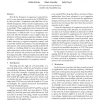Free Online Productivity Tools
i2Speak
i2Symbol
i2OCR
iTex2Img
iWeb2Print
iWeb2Shot
i2Type
iPdf2Split
iPdf2Merge
i2Bopomofo
i2Arabic
i2Style
i2Image
i2PDF
iLatex2Rtf
Sci2ools
SIGCOMM
2006
ACM
2006
ACM
Designing DCCP: congestion control without reliability
DCCP, the Datagram Congestion Control Protocol, is a new transport protocol in the TCP/UDP family that provides a congestion-controlled flow of unreliable datagrams. Delay-sensitive applications, such as streaming media and telephony, prefer timeliness to reliability. These applications have historically used UDP and implemented their own congestion control mechanisms—a difficult task—or no congestion control at all. DCCP will make it easy to deploy these applications without risking congestion collapse. It aims to add to a UDP-like foundation the minimum mechanisms necessary to support congestion control, such as possibly-reliable transmission of acknowledgement information. This minimal design should make DCCP suitable as a building block for more advanced application semantics, such as selective reliability. We introduce and motivate the protocol and discuss some of its design principles. Those principles particularly shed light on the ways TCP’s reliable byte-stream semant...
Congestion Control | Congestion Control Mechanisms—a | Datagram Congestion Control Protocol | SIGCOMM 2006 |
Related Content
| Added | 14 Jun 2010 |
| Updated | 14 Jun 2010 |
| Type | Conference |
| Year | 2006 |
| Where | SIGCOMM |
| Authors | Eddie Kohler, Mark Handley, Sally Floyd |
Comments (0)

